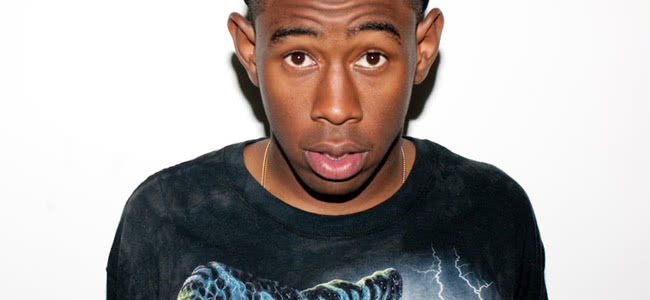Tyler, The Creator loves to make people mad. The solo hip-hop artist and OFWGKTA member has built a career out of being a contradiction: a misunderstood, fatherless teenager with a violent message.
He’s an incredible rapper who can’t stay out of the news for promoting violence against women or for his homophobic slurs. The latest incident: attempts to get his VISA revoked on the basis of him inciting violence against women at his Sydney show. So is it all just harmless fun, or does he actually have something to answer for?
He has said that he writes controversial lyrics just to fuck with people and that his critics read too much into it. It’s eminent to consider though that gay people are still not accepted enough to be legally married in Australia and most of America, and that 1 in 5 American women will be raped in their lifetime – half of them when they are still teenagers.
The content of his music, no matter how supposedly innocent the intentions may be, reassert the social norms that make these facts possible.
That’s not to say, of course, that a perfectly normal, happy teenager will suddenly start mistreating women and gay people after listening to an OFWGKTA song. But the music makes these attitudes acceptable, and even desirable.
Tyler, The Creator’s works create an ‘us against them’ mentality, and to be ‘us’ you have to be okay with what he advocates, no matter how badly it paints a picture of ‘them.’
“Tyler, The Creator’s works create an ‘us against them’ mentality, and to be ‘us’ you have to be okay with what he advocates, no matter how badly it paints a picture of ‘them’.”How are his listeners supposed to believe that misogyny and homophobia, verbal or otherwise, is wrong, when they are constantly bombarded with cultural signifiers that it isn’t? When Tyler encourages his audience to chant “bitch, kill yourself” at a random woman who he “bumped in to” in the crowd at one of his shows, why wouldn’t his fans think this would be appropriate behaviour for them to partake in at another setting?
Tyler, The Creator is a straight man, and therefore he is not in a position to decide if calling homosexuals faggots – 231 times on one album, incidentally – or proudly imagining himself raping women is acceptable to these groups of people.
But he didn’t invent teenage cruelty, and he definitely isn’t alone. There’s a lot of hip-hop, and a lot of music in general, that has a lot to answer for.
There’s also an argument to be made that subtle, pervasive discrimination is far worse than an angry, confused nineteen-year-olds’ bravado. But the motivations of Tyler himself are almost irrelevant.
Whether or not he is genuinely a monster who hates gay people and rapes and murders pregnant women, or just an angsty kid with a big mouth, doesn’t change the content of his raps. For the record, no one is accusing him of the former, including Frank Ocean and OFWGKTA’s lesbian DJ Syd The Kyd. What matters are his words, and the influence they have on his listeners.
“He’s an incredibly talented artist, but that doesn’t mean that everything that comes out of his mouth is blameless.”People would have you believe that misogyny and homophobia in hip-hop are acceptable because they’re a part of “hip-hop culture,” something which is tied in with black culture, and anyone who is offended just “doesn’t get it”. This is not only misguided, but doesn’t logically follow considering the majority of Tyler’s listeners seem to be straight white teenage boys, as verified in our review of his Melbourne show.
This concept is also racist in itself; as if having dark skin and being from a certain socioeconomic background makes a person inherently prone to sexual violence and hatred. Of course it doesn’t, and that insinuation is a backwards one for any artist to make.
Excusing the behaviour of hip-hop artists on that basis makes the implicit assumption that hip-hop culture should not be held to the same standard as all the other parts of Western society. It implies that hip-hop culture is not of the same standard, which is a patronising and elitist attitude to both those making the music, and the listeners.
Tyler, The Creator is an incredibly talented artist, but that doesn’t mean that everything that comes out of his mouth is blameless. Just because he doesn’t want to be a role model, doesn’t mean people aren’t going to listen to what he says or pay attention to how he acts.
Hip-hop has changed over the past thirty years. Society has changed over the past thirty years. In 2013, glamorising violence against women and gay people is not okay. It’s not okay if the beats are good, not okay if it comes from a nineteen-year-old hip-hop star. It is never okay.




































